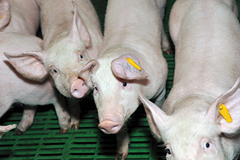Vion: adding margin
 Seamus Carr, Managing Director of Vion Pork Business, talks to Owen McQuade about the challenges in the local pork processing supply chain and his focus on adding margin to the business.
Seamus Carr, Managing Director of Vion Pork Business, talks to Owen McQuade about the challenges in the local pork processing supply chain and his focus on adding margin to the business.
Seamus Carr is Managing Director of Vion’s pork business which has a turnover of £600 million per annum and employs 5,000 people, including 900 in Northern Ireland.
The pork business farms 11,000 outdoor sows in Scotland, with a weekly slaughter of 46,000 pigs at three plants. The company’s primary pork processing plant, with 50 per cent of its throughput, is at Cookstown in County Tyrone where there are 800 employees. The company also operates the in-store McGee butchery franchise for Asda in Northern Ireland. Carr led the successful management buy-out of the business at the start of this year.
Whilst much of the strategy of food processors in recent years has been to focus on added value, with a strategic drive towards higher added value, Carr challenges this premise. Instead the plain-speaking Carr sees his company’s focus on adding margin.
“I’m not an advocate of added value, but I am a strong advocate of added margin,” he states. “I don’t buy into the concept of added value. There is a lot of cost in developing niche products and additional products. So selection of your product range is critical.
“At the end of the process you engage in to process the product, you must be enhancing the profitability. The challenge of added value products is that they can incur a disproportionate level of costs, eroding the actual inherent contribution from that product. So if you are in added value, you have to be very good at it and very skilled in the management of your costs.”
Carr adds: “It’s a question of ‘sticking to your knitting’ as everything is so competitive and you have to specialise in something. In pig meat, it is not by accident that in southern Ireland, there is no primary producer that is involved in added value or consumer products. The industry is broken down into primary producers and secondary producers and the point of focus is there and I don’t think that is by accident.”
Efficiency
Supply chain efficiency, in his view, is about measurement and bench-marking. “If you are going to play in the game, your position in the league table will be influenced by how good and how efficient you play the game,” he explains. “That is by measurement and benchmarking. I don’t mean that as a criticism of farming, it is also an internal criticism of processing.
“The local supply chain is not strong enough, not efficient enough and not well enough developed. In farming, the average pigs produced per sow, which is the rule-of-thumb benchmark, is in Northern Ireland 22 pigs on average per sow. There are some farmers doing 26 or even 27. If the whole industry was doing 27, and I know there are structural challenges around that, we would be a better industry. Likewise in processing, scale, efficiency and productivity – all these measures – [we] need to be against the best in Europe because we are competing in a global market. Every element of the supply chain has to be individually competent and collectively synergised.”
Carr also identifies the need to enter the niche markets for pig meat in the USA and China. “We are already an exporting business but the challenges are to get into these niche markets,” he points out. “For example, for pig meat from Northern Ireland, America is very important. There is a deficit of ribs in the US at the moment, so the primary product going there [is] ribs not pig meat and they pay £1 per kilo higher than in Europe for ribs.
“Combining these niche markets with supply chain efficiency round out the business model for us.”
When asked if he has come across someone doing it well, he replies: “Denmark.”
“In Denmark, the pig processing sector is effectively a co-operative society with a whole, joined-up industry, farmers benefit from the dividends from the Danish Crown Company, which takes all the pigs from the farmers to their own specification and leads the industry in cutting edge developments.”
On the wider issue of the local agri-food strategy, Carr sees this as both an opportunity and a challenge: “I hope it [the agri-food strategy] has an execution plan, as strategies without execution plans are useless. A challenge for our business and the agri-food sector is the capability to deliver. We must have the management capability to execute the plan and the plan must reflect what management teams can accomplish.”
Seamus Carr is Managing Director of Vion Pork Business, part of Vion Food Group, a $10 billion primary agricultural business. Seamus has also held various senior management roles in the pig meat processing business under Unipork and Glanbia PLC.
Having initially trained as an accountant, Seamus now has over 20 years’ experience in the agri-food industry, including nine years spent in Almarai in the Middle East. Seamus worked with Masstock/Almarai and progressed to a senior management position within the dairy farming division, which is the largest integrated dairy farming operation in the world.
When asked what is the one issue he will be focusing on in the future, he replies: “It’s more an opportunity: the ability to get connectivity through the supply chain. That is always a difficulty. When you have commercial interfaces, it is sometimes hard to share that equally through the chain and to get the chain efficient.”







